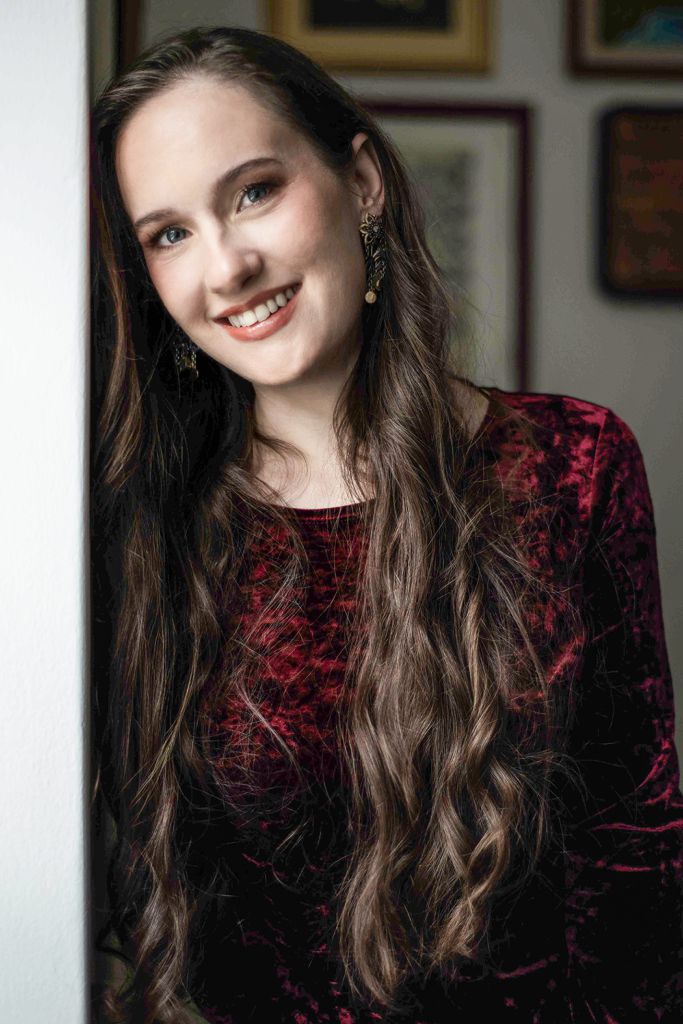It was in 2020 that mdw alumna Josipa Bainac-Hausknecht first worked at the Exilarte Center for Banned Music. The topic of music in exile, still as current as ever, occupies an important place in this Croatia native’s academic and artistic doings.

With an artistic family to inspire her, Josipa Bainac-Hausknecht began making music at a very young age. “I started singing quite early in life; singing was the place that my childhood soul called home.” War was something very real to Josipa, who grew up in Croatia during the 1990s—and she describes musical moments as rare occasions on which she and her family could be happy together. Later on, after graduating from a music-focused secondary school in Vinkovci, the talented singer chose to study voice (performance and education) at the University of Zagreb’s Academy of Music. “Many of my fellow students raved about Vienna and about how important musical life was there.” She eventually applied for admission to the mdw and continued her studies here in the Lied and Oratorio master’s degree programme following graduation in Zagreb. A special interest of hers is the performance of contemporary music, as can be seen in her longstanding musical collaboration with composers such as Johanna Doderer, Gabriele Proy, Michael Berkeley, Nicholas Ansdell Evans, and Akos Banlaky. “Those who create music have the gift of being able to observe everyday life from a different perspective that allows them to create up-to-date portraits and provide us with insights on life in the present day—so every opportunity for collaboration needs to be taken.” In doing so, the trained voice teacher has learned a great deal about how to use her own voice as well as about new modes of expression and ideas. “When I première a work together with its composer, it’s always a one-of-a-kind experience. We transcend the boundaries of our familiar world and venture out into unfamiliar terrain.” This idea of boundary-crossing is also reflected in her collaboration with Austria’s Federal Ministry of European and International Affairs (BMEIA): a number of her concert projects mounted at the invitation of various Austrian Cultural Forum locations and embassies have so far taken her to Riyadh, Jakarta, London, Budapest, Sarajevo, Luxemburg, and New York. “These platforms present an opportunity for back-and-forth with other musicians, and that gives rise to interesting discourses. We also get to know the audiences there and their respective needs—which is fascinating.”
Singing was the place that my childhood soul called home. It was during our musical moments together that my family and I could be happy.
Since March 2023, Bainac-Hausknecht has been employed as a project manager for artistic and scholarly projects at the mdw’s Exilarte Center. The 2020 production of a Christmas CD including works by Hans Gál and Wilhelm Grosz was the first among several projects at the Center in which she has participated as a performer. She then continued developing this collaboration, working directly with her first few legacies from the collection. “Being a singer, my focus is on Lieder and other vocal works. What I’m after here is being able to study these legacies and interpret the music they contain.” The path leading to such works’ performance is a long one, however. When they arrive, they first need to be catalogued and ordered. The musical material is then turned over to a publisher and prepared for publication. Only after this has happened can these works be performed. “As a performer, I look for suitable funding opportunities as well as suitable performance venues—but we care for this music from the very beginning.”
The feedback we consistently get is that working with exiled music leaves all the musicians who do so feeling artistically and above all personally enriched.
The interest in music by exiled composers, says this committed artist and scholar, is growing steadily. “We receive new requests every week and work constantly to get these artistic legacies published.” The growing awareness of this theme, she says, can be attributed in part to the Exilarte Center’s work. “We have more and more people attending our symposia and concerts, seeing as music from exile is and will remain a hot topic. I also notice how this music functions as a bridge—between the past, the present, and the future.” By dealing with the past and with musicians’ personal fates, she notes, one develops a special kind of empathic ability that plays a central role in artists’ communication of their art. “Empathy is one of the most important components when you turn to an audience as an artist. And it’s with this empathic power that we in the Exilarte team are striving to research, publish, and perform this music.”
Event tip:
From the concert series Echo of the Unheard: André Singer and Hans Winterberg
12 December 2023, 7 p.m.
Kleiner Ehrbar Saal
Mühlgasse 28, 1040 Vienna

